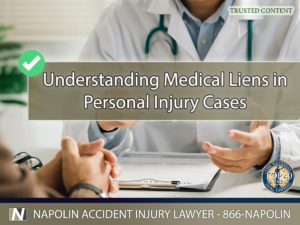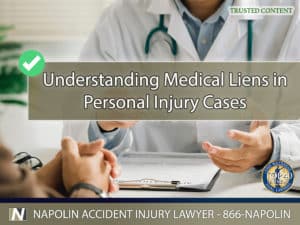Understanding Medical Liens in Personal Injury Cases
Introduction to Understanding Medical Liens in Personal Injury Cases
Medical liens present a complex yet vital aspect of personal injury cases. For individuals caught in the midst of personal injury disputes in California, comprehending the implications of a medical lien on their settlement is crucial. This guide seeks to demystify the intricacies of medical liens, their types, their impact on personal injury settlements, and the role of legal representation in negotiating these claims.

Understanding Medical Liens in Personal Injury Cases
Understanding Medical Liens in Personal Injury Settlements
A medical lien, in the context of a personal injury settlement, grants healthcare providers or hospitals the right to be reimbursed from a personal injury claim for their rendered services. Fundamentally, there are two types of medical liens – those created through an Insurance Policy/Public Health Benefits and those created by Medical Lien Agreements.
Medical Lien Through Insurance Policy or Public Health Benefits
Commonly, insurance companies include clauses in their policies establishing a lien on personal injury proceeds, often referred to as subrogation rights. These rights extend to healthcare expenses paid by federal programs like Medicare and Medicaid, owing to the Medicare Secondary Payer Act (MSPA), a federal law that enables these agencies to seek repayment from personal injury awards and settlements.
When a health insurance company bears the cost of medical bills associated with a personal injury claim, it secures a medical lien on any proceeds the claimant might receive from a personal injury settlement. The provider must be reimbursed for its payments before the claimant receives the settlement money.
Medical Lien Agreements
A medical lien can also be instituted by signing an agreement with a hospital, medical facility, or healthcare provider. This contract binds the medical provider to deliver healthcare services in return for a promise of payment from the claimant's personal injury case. Should the personal injury case not succeed, the claimant becomes liable for the medical bills.
Medical liens and hospital liens can facilitate accident victims in acquiring needed healthcare post-injury. However, the agreement to enter into a medical lien is voluntary for physicians and healthcare providers. Non-compliance on the provider's part may result in the unpaid bills being forwarded to a collection agency.

Extent of Medical Liens on Personal Injury Settlements
Extent of Medical Liens on Personal Injury Settlements
If a claimant has signed an agreement with a medical provider, the provider is legally entitled to full reimbursement for their services, which could amount to the total of the medical bills.
In contrast, subrogation rights for health insurance providers operate differently. California has legislated several laws that restrict how much a health insurance provider can claim from a personal injury settlement for subrogation liens. However, these laws only apply to the subrogation rights of insurance companies.
Key Legal Doctrines and Laws in California
California Civil Procedure §3040 places a limit on how much a health insurance company can retrieve from a personal injury settlement. The provider is restricted to the lesser of either one-half of the total personal injury settlement if the claimant did not have legal representation, one-third of the total settlement if represented by an attorney, or the total cost of the medical services provided.
The Common Fund Doctrine inhibits insurance companies from profiting from subrogation claims if they did not contribute to the recovery of money for the personal injury claim. This means that a health insurance company can't claim reimbursement without contributing to the claimant's attorney’s fees.
The Made Whole Doctrine advocates that victims have the right to full compensation for all damages resulting from another party's negligence or intentional torts. This doctrine protects victims from health insurance providers claiming from a settlement that doesn't cover all of the victim’s damages.
Negotiating Medical Liens
An experienced personal injury lawyer can be instrumental in reducing the amount owed for medical liens and subrogation claims by negotiating payments with the lien holders. Understanding the laws that limit the amounts some lien holders can collect and presenting compelling arguments for lower payments are key areas where legal representation is valuable. Before accepting a personal settlement offer, it is advisable to seek legal counsel to safeguard your right to fair compensation.

Understanding Medical Liens in Personal Injury Cases
Conclusion to Understanding Medical Liens in Personal Injury Cases
The intricacies of medical liens in personal injury cases can be overwhelming. Yet, understanding their implications is essential for anyone embroiled in a personal injury dispute in California. Whether through insurance policies or lien agreements, medical liens can significantly impact the outcome of a personal injury settlement. The guidance of a knowledgeable attorney can be invaluable in navigating these complexities and securing a just outcome. If you are in need of legal help, contact us at (866)-NAPOLIN to secure a free consultation. With extensive litigation experience in this area, we are well-equipped to champion your rights.
- Safely and Legally Navigating Parking Lots in California - July 15, 2024
- Navigating the Aftermath of a Highway Auto Accident in California - July 15, 2024
- An Overview of California's Commercial Truck Insurance Laws - July 15, 2024
